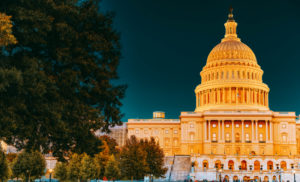
The CDC decreases distancing guidelines in schools, USDA increases food stamp benefits, and more…
IN THE NEWS
- The Centers for Disease Control and Prevention (CDC) updated its guidance for schools reopening during the coronavirus pandemic. The CDC recommended that mask-wearing elementary school students and some middle and high school students only need to maintain three feet of distance while inside the classroom, decreasing the distancing guidelines from six feet. CDC Director Rochelle Walensky stressed the importance of in-person instruction for students and said that “CDC is committed to leading with science and updating our guidance as new evidence emerges.” Pedro Martinez, the superintendent of the San Antonio Independent School District, reportedly identified the prior social distancing recommendations as the biggest challenge for in-person learning and called the updated guidance a “game changer.”
- The U.S. Department of Agriculture (USDA) announced a 15 percent increase in Supplemental Nutrition Assistance Program benefits through September 2021. USDA will dedicate an estimated additional $3.5 billion to qualifying households, which equates to $28 more per person, per month. Secretary of Agriculture Tom Vilsack said that “we cannot sit by and watch food insecurity grow in the United States,” crediting the American Rescue Plan for bringing “help to those hurting the most” from the pandemic.
- The Federal Energy Regulatory Commission issued an order establishing a new standard for evaluating greenhouse gas emissions when approving natural gas pipeline replacement projects. The agency previously ruled that it was not allowed to assess the impact of greenhouse gas emissions on the environment. The new order was a response to a recent appellate court decision requiring the agency to consider reasonably foreseeable emissions associated with pipeline projects and evaluate their significance. Gillian Giannetti, an attorney at the Natural Resources Defense Council, applauded the order but called on the agency to abandon other Trump Administration policies that prevent it from considering “all of a project’s emissions—including its upstream and downstream emissions—in its reviews.”
- President Joseph R. Biden announced that he plans to nominate Lina Khan for Commissioner of the Federal Trade Commission. Khan—a 32-year-old associate professor at Columbia Law School—pushed for antitrust reform in her seminal research and involvement in the House Judiciary antitrust subcommittee investigation into digital platforms. Sarah Miller, executive director of the American Economic Liberties Project, stated that Khan “will be critical for guiding the agency out of decades of severe institutional failure.”
- The National Transportation Safety Board asked the Federal Aviation Administration to increase safety requirements for some passenger-carrying flights—such as commercial air tours or parachute jump flights—that are less regulated than other aviation flights. The Transportation Safety Board noted that some companies “intentionally exploited regulatory loopholes” and that people who take these less-regulated flights are likely unaware of the risks. The request follows eight accidents, including a hot air balloon crash that killed 15 passengers.
- Pennsylvania Governor Tom Wolf announced a clean energy initiative that includes building seven solar arrays throughout Pennsylvania. These solar arrays will supply approximately half of the energy used by the state government. The solar project will begin operation in 2023 and will be the largest government investment in solar energy in the United States. Governor Wolf touted the decision as “leading by example in demonstrating sustainable governance and lowering greenhouse gas emissions to reduce the risks of climate change in Pennsylvania.” Solar analyst, Colin Smith, reportedly said that the decision to shift to renewables demonstrates that the cost of solar is a sustainable alternative in the energy marketplace.
- The Board of Governors of the Federal Reserve System announced that it will allow temporary lifting of the supplemental leverage ratio requirement, a rule that limited how much money each bank is allowed to lend. During the pandemic, the Federal Reserve Board temporarily removed that limit for most commercial banks, but it will come back into effect at the end of the month. The Board also announced that it will soon seek public comment on redesigning and recalibrating its supplemental leverage ratio rules.
- Federal Reserve Governor Lael Brainard announced that the Federal Reserve Board will create a new committee focused on examining how climate change could affect the global financial system. The committee will explore how ripple effects from climate change could ultimately harm “households, businesses, and communities.” Brainard emphasized that “it will be critical to make progress, even if initially imperfect, to ensure that the financial system is resilient to climate-related risks.” U.S. Representative Andy Barr (R-Ky.) reportedly opined that it was “highly speculative” to connect “hypothetical climate scenarios to risk to the entire financial system.”
- The Consumer Financial Protection Bureau issued a series of annual reports summarizing consumer complaints and describing enforcement of the Fair Debt Collection Practices Act. The agency reported that consumer complaints increased by 54 percent in 2020 compared to the previous year. The agency explained that the number of complaints increased because credit reporting agencies like Equifax and TransUnion stopped offering substantive and detailed responses to consumer complaints during the pandemic, leading consumers to turn to the agency. In a letter attached to the consumer complaint report, Acting Director David Uejio said that the pandemic sent disruptive shockwaves “across the planet that were felt deeply in the consumer financial marketplace.”
WHAT WE’RE READING THIS WEEK
- In a recent paper, John Guyton, a researcher at the Internal Revenue Service (IRS), and his coauthors examined the extent to which households at the top of the U.S. income distribution evade taxes. Guyton and his coauthors found households in the top 1 percent of the income distribution failed to report 21 percent of their income to the IRS, of which 6 percent is attributed to “sophisticated evasion that goes undetected in random audits.” The estimate, however, likely undercounts the true amount of tax evasion, Guyton and his coauthors note. To overcome tax evasion by wealthy households, Guyton and his coauthors recommended increasing audit rates, facilitating whistle-blowing, and increasing resources for tax administration.
- In an article in the Journal of Pediatrics, Leah Middelberg, emergency medicine physician at Nationwide Children’s Hospital, and her coauthors analyzed the number of reported incidents of children ingesting high-powered magnets. Middelberg and her coauthors found that after the U.S. Consumer Product Safety Commission halted the sale of high-powered magnet sets, instituted a recall, and published a rule limiting magnet sales, poison control calls decreased by 33 percent. After a court overturned the Consumer Product Safety Commission rule in 2018, Middelberg and her coauthors observed a 444 percent increase in magnet-related poison control calls and argued that the data demonstrated “the urgent need to protect children via preventative efforts and government action.”
- According to a recent article in the Yale Journal on Regulation, the number of former congressional staffers who serve as a commissioner in an independent regulatory agency has increased in recent years. Brian Feinstein, professor of legal studies and business ethics at the University of Pennsylvania, and M. Todd Henderson, professor at the University of Chicago Law School, argued that this trend has the benefit of bringing political savvy into regulatory commissions but warned that it could encourage more overtly political behavior within independent agencies. Feinstein and Henderson recommended that presidents should exercise greater oversight of independent agencies and should consider institutional allegiances more carefully when evaluating potential appointees.
FLASHBACK FRIDAY
- In a 2013 essay in The Regulatory Review, Sean Moloney, founding member of The Review, highlighted the importance of the Federal Aviation Administration’s (FAA) reporting requirements in achieving a safe aviation industry. Moloney discussed that the U.S. Government Accountability Office (GAO) urged the FAA to update their data-collection policies to identify potential trends in safety issues. Moloney noted that, according to GAO’s report, there were several gaps in the FAA’s data collection, including its incomplete data on operational errors and annual inspections.



